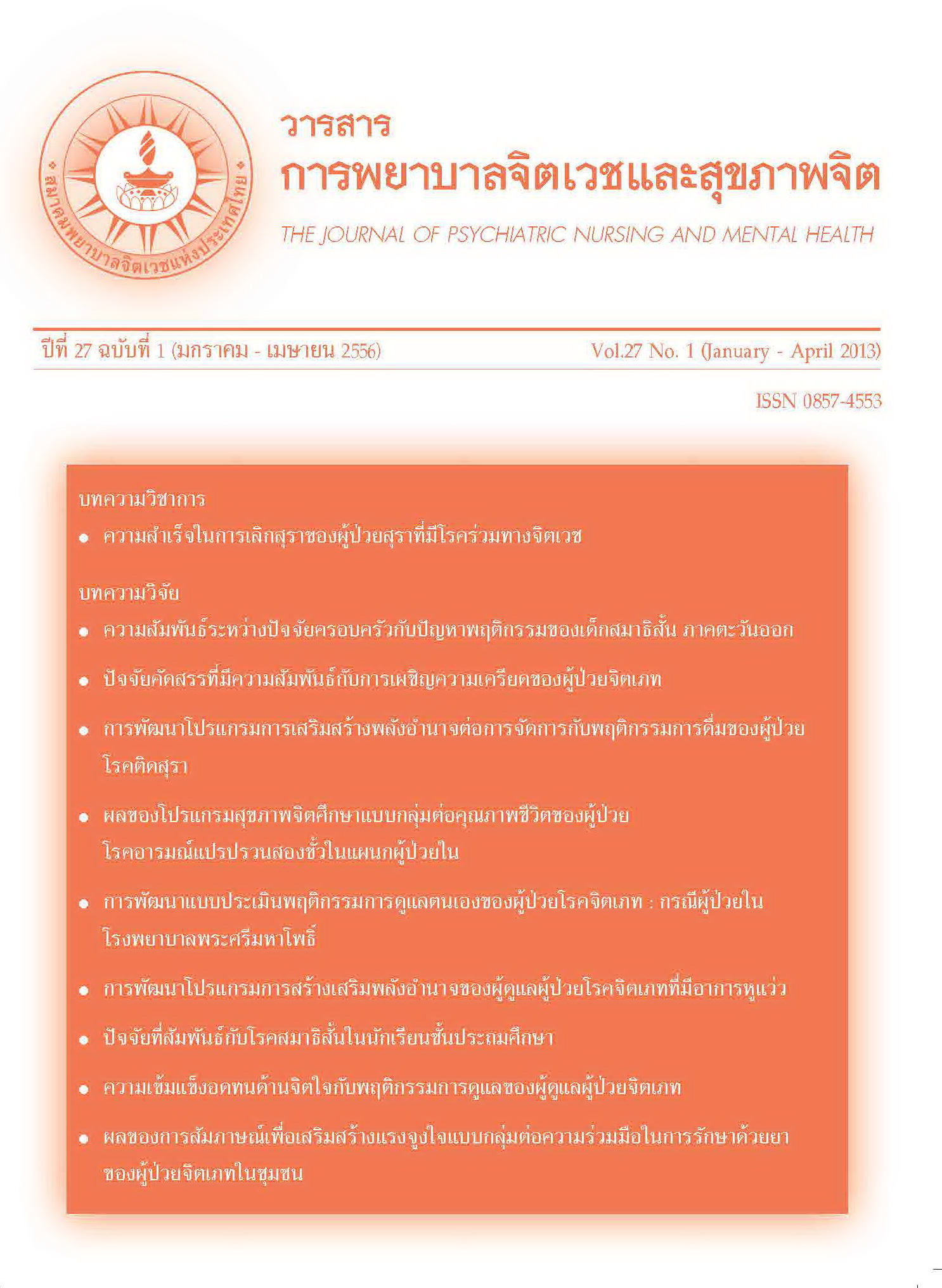ปัจจัยคัดสรรที่มีความสัมพันธ์กับการเผชิญความเครียดของผู้ป่วยจิตเภท
Main Article Content
บทคัดย่อ
บทคัดย่อ
การวิจัยครั้งนี้มีวัตถุประสงค์ เพื่อศึกษาวิธีการเผชิญความเครียดของผู้ป่วยจิตเภท และเพื่อศึกษาความสัมพันธ์ระหว่าง ระดับการศึกษา อายุ อาการทางบวก อาการทางลบ ความบกพร่องทางประสาทการรู้คิด การสนับสนุนทางสังคม และการรับรู้สมรรถนะแห่งตน กับการเผชิญความเครียดของผู้ป่วยจิตเภท กลุ่มตัวอย่าง คือผู้ป่วยจิตเภทที่มารับบริการแผนกผู้ป่วยนอกโรงพยาบาลสังกัดกรมสุขภาพจิต จำนวน 150 คน ได้จากการสุ่มแบบง่าย เครื่องมือในการวิจัยคือ แบบบันทึกข้อมูลส่วนบุคคล แบบประเมินการเผชิญความเครียด แบบประเมินอาการทางบวก แบบประเมินอาการทางลบ แบบทดสอบสมรรถภาพสมองของไทย แบบสัมภาษณ์การสนับสนุนทางสังคม และแบบวัดการรับรู้สมรรถนะแห่งตน เครื่องมือทุกชุดได้รับการตรวจสอบความตรงเชิงเนื้อหาโดยผู้ทรงคุณวุฒิ และมีค่าความเที่ยงสัมประสิทธิ์แอลฟาของครอนบาคของเครื่องมือทุกชุด ยกเว้นแบบบันทึกข้อมูลส่วนบุคคล เท่ากับ .93,.90, .85,.80, .86 และ .80 ตามลำดับ วิเคราะห์ข้อมูลโดยใช้ความถี่ ร้อยละ ค่าเฉลี่ย ส่วนเบี่ยงเบนมาตรฐานสัมประสิทธิ์สหสัมพันธ์สเปียร์แมน และเพียร์สัน
ผลการวิจัยสรุปได้ว่า
1. ผู้ป่วยจิตเภทมีคะแนนเฉลี่ยของการเผชิญความเครียดด้วยวิธีการจัดการกับปัญหาสูงที่สุดและอยู่ในระดับมาก (=3.71, S.D.=11.23)
2. การรับรู้สมรรถนะแห่งตน การสนับสนุนทางสังคม อาการทางลบ ความบกพร่องทางประสาทการรู้คิด และอาการทางบวกมีความสัมพันธ์กับการเผชิญความเครียดด้วยวิธีการจัดการกับปัญหาอย่างมีนัยสำคัญทางสถิติ(r=.731,.546, -.380, -.183 และ -.173 ตามลำดับ)
3. อาการทางบวกมีความสัมพันธ์กับการเผชิญความเครียดด้วยวิธีการใช้อารมณ์และความรู้สึกอย่างมีนัยสำคัญทางสถิติ (r = .258)
4. การสนับสนุนทางสังคม การรับรู้สมรรถนะแห่งตน อาการทางลบ และความบกพร่องทางประสาทการรู้คิดมีความสัมพันธ์กับการเผชิญความเครียดด้วยวิธีการหลีกเลี่ยงสิ่งเร้าที่ก่อให้เกิดความเครียดอย่างมีนัยสำคัญทางสถิติ (r = .479, .438, -.539 และ -.191 ตามลำดับ)
5. ระดับการศึกษา และอายุไม่มีความสัมพันธ์กับการเผชิญความเครียดอย่างมีนัยสำคัญทางสถิติ
คำสำคัญ : ผู้ป่วยจิตเภท, การเผชิญความเครียด, ปัจจัยคัดสรร
Abstract
The purposes of this descriptive research were study coping of schizophrenic patients, and study the relationships between coping and selected factors including education, age, positive symptoms, negative symptoms, cognitive impairments, social supports and self-efficacy schizophrenic patients. A total of 150 subjects were drawn from patients diagnosed with schizophrenia who sought treatment at outpatients department of psychiatry using simple random sampling. The research instruments were demographic questionnaires, Coping Inventory for Stressful Situations, Positive and Negative Syndrome Scale, Thai Mental State Exam, Social Support Interview, and Self-Efficacy Scale. All instruments were tested for content validity by 5 experts. The Cronbach’s Alpha coefficient reliability of all instruments except demographic questionnaires were .93, .90, .85, .80, .86and .80 respectively. Statistic techniques utilized in data analysis were frequency, percentages, mean, standard deviation, Spearman’s Rank and Pearson Product Moment Correlation Coefficient. Major finding of this study were as follows:
1. The schizophrenic patients had the highest scores on task-oriented coping, which was in the high level ( = 3.71, S.D. = 11.23).
2. Self-efficacy, social supports, negative symptoms, cognitive impairment and positive symptoms were statistical significantly related to task-oriented coping (r = .731, .546, -.380,-.183 and -.173, respectively).
3. Positive symptoms was statistical significantly related to emotional-oriented coping (r=.258).
4. Social supports, self-efficacy, negative symptoms and cognitive impairment were statistical significantly related to avoidance-oriented coping (r = .479, .438, -.539 and -.191 respectively).
5. Education and age reported had no significantly related to any type of coping.
Key words : selected factors, coping, schizophrenic patients
Article Details
บทความที่ได้รับการตีพิมพ์แล้ว เป็นลิขสิทธิ์ของสมาคมพยาบาลจิตเวชแห่งประเทศไทย


